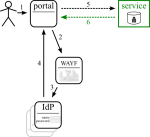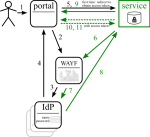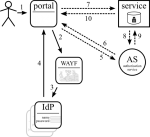CLARIN/Security for web services
Approaches
Open
All services trust each other. No technical security measures (other than, possibly, blocking complete strangers); managable upto ~15 services [TODO ref needed]
Shibboleth + delegation
Shibboleth is already used for federated authentication. It has ECP support with delegation, though only through a plugin. The next major IdP release may include it though.
One cannot expect each IdP to install this plugin, or to have the latest version installed [TODO check if this is the case with Shibboleth version policies]. Therefore this option is not viable.
SAML ECP
(see Shibboleth) [TODO would there be other SAML ECP options than Shibboleth?]
OAuth 1.0
OAuth 1 is used on the world wide web as a method to access server resources on behalf of a resource owner. It is used by quite a number of big websites like Google, Twitter.
OAuth 1.0 requires browser redirection and confirmation [TODO check if confirmation is optional]. This would be acceptable for the portal scenario, but not for nested service invocations (real delegation).
OAuth 2.0
OAuth 2 is the new version of OAuth, which supports many more scenario's. This is being adopted (Facebook is on the wagon already).
Links
Standards
- User Managed Access (UMA) has some overlap with this work
- OASIS Web Services Security: WS-Security, username, X.509, SAML
- A SASL and GSS-API Mechanism for SAML, uses base64 encoded SAML request in URL
- OAuth 2.0, and with SAML assertions
Libraries
- OAuth 2 assertion profile library
- Shibboleth ECP delegation, web-service client, and configuring it.


